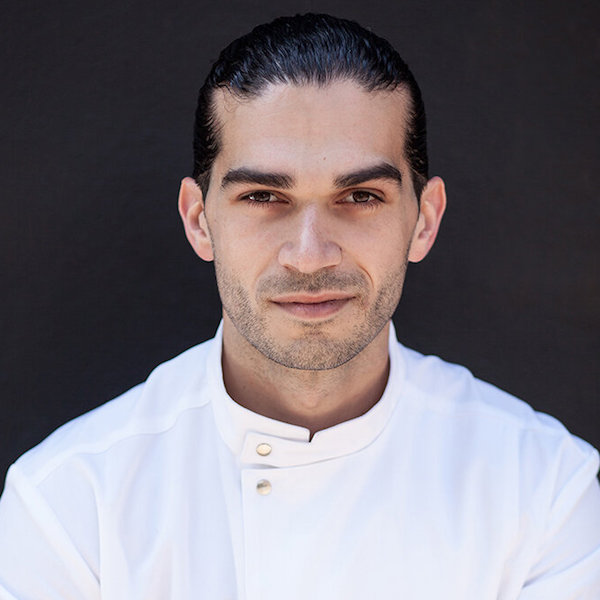For article four in the Hotel Designs LAB series, Hotel Designs and Arigami explore wellbeing through the lens of F&B. Helping us reimagine the wellness dining experience are gastrophysicist and award-winning neuroscientist Prof. Charles Spence (Oxford University), nutrition coach Carola Becker and multi-sensory chef Jozef Youssef (Kitchen Theory). Ari Peralta writes…

Our series, which has already explored topics such as sound, hygiene and biophilic design, empowers hoteliers, designers, architects and suppliers with informed ideas and innovations that promote validated wellbeing. Following the impact of the global pandemic, the wellness market will continue to exponentially rise, and evolve. Wellbeing, and specifically wellness dining, has become a pivotal aspect of our everyday lives – and is here to stay.
Guests are actively pursuing products, places and experiences that encourage wellbeing and healthy outcomes. Wellness dining is quickly becoming a strong part of that ethos, with more hotel brands pivoting towards a greener and more nutritional approach to their F&B operations. Wellness is a state of optimal health that is based on maximising human potential. Our bodies and mind, much like our environment, depend on energy. That got us thinking: How can we help transform the industry’s approach to food, by focusing more on intended outcomes? How can we create nutrient-rich offerings that are also tasty and delicious? How can we inspire design to create multi-sensory eating spaces that encourage wellbeing?
Meet our experts:
- Prof. Charles Spence (Oxford University)
- Nutrition coach Carola Becker
- Multi-sensory chef Jozef Youssef (Kitchen Theory)
In this article, we brought together a dream team of experts covering neuroscience, psychology, gastrophysics, nutrition and the culinary arts. In doing so, we challenged our experts to help us redefine ‘nutrition with purpose’. And here’s a snapshot of what we explored:
Conscious consumption
- Guests’ eating and shopping habits are rapidly changing.
- Guests are seeking more than just indulgence out of travel experiences.
- Guests are more educated on ingredients, sourcing and environment.
- Conscious consumption is intergenerational
Functional foods
- Nutrition-rich meals make a difference by improving guest health on a
- biological level.
- Hotels must go beyond carbs, fats and proteins.
- Food choice can significantly influence guest behavioural health
- throughout their stay.
- Develop purpose-driven menus using functional foods.
Multi-sensory experiences:
- Taste and flavour is a construct of the mind.
- Sound, smell and other sensory elements can elevate food experiences.
- Integrated multi-sensory design can help improve our perception of healthy foods.
Conscience consumption
It seems like no matter where you look, sustainability is becoming one of the most talked-about issues facing society. The impact that people, and their actions, have on the environment is becoming clearer by the year and conscious consumption is an integral part of that conversation. According to Harvard Health, ‘conscience consumption’ refers to consumers being more attentive to their food, as they buy, prepare and serve it.
“Hotels that integrate or embody wellbeing beyond the spa, are growing faster than competitors.”
There is a growing sense of urgency from consumers with elevating expectations; due to pure frustration from the lack of action shown across global issues. Origin, source and seasonality of foods, as well as environment and the hotels brand’s values, really matter. Guests are increasingly attracted to hotels that are vocal about the sustainable changes they’ve made (or are working towards). This matters, especially to the 58 per cent of travellers, according to Harvard Business Review, who say they would pay at least five percent more if they knew there would be a lighter environmental footprint.
Around 30 per cent of Marriott’s menus are designed to reflect various dietary preferences, with options that also tout sustainable and responsible sourcing, which is also emerging as a priority for guests.
Charles Spence is head of the Crossmodal Research Laboratory and professor of experimental psychology at the University of Oxford. He says that hotels have an opportunity to transform their approach to healthy foods but first, they must take a step back and reframe F&B altogether. “Hotels need to embrace sustainability, nutrition, multi-sensory design and psychology, and expand on the idea of what healthy eating looks and feels like,” he says. “Search for examples of healthy meals and you’ll notice that the definition of ‘healthy’ is pretty narrow, boring and unappealing.” In his latest book, Sensehacking, Spence shows how our senses change how we think and feel, and how ‘hacking’ them, can help reduce stress, increase productivity and promote happiness.
As guest’s booking criteria begin to shift, so do their travel habits and motivations. For the conscious traveller, a great stay is now determined by more things than a great location and fast wifi connection. Guests want to feel good about where they spend their money, and they want to support businesses who can manage (and communicate) the effect they have on the environment. Hotels who can successfully capitalise on this momentum will stand out from the crowd and attract even more guests whose values align with theirs. No matter the generation, conscious consumption permeates indulgence more than ever before.
Functional foods
According to nutritional coach Carola Becker, the new conscious guest is concerned with both their physical and mental wellbeing and open to food experiences that go far beyond indulgence. This movement has led to the growth and development of functional foods. ‘Functional foods’ are defined as products that may provide benefits beyond basic nutrition and consist of a variety of food components that may reduce disease and promote health. The concept originated in Japan in the 1980s when government agencies started approving foods with proven benefits in an effort to improve the health of their population. Functional foods are generally separated into two categories:
Conventional foods – natural, whole-food ingredients that are rich in important nutrients like vitamins, minerals, antioxidants, and heart-healthy fats. These include:
- Fruits: berries, kiwi, pears, peaches, apples, oranges, bananas
- Vegetables: broccoli, cauliflower, kale, spinach , zucchini
- Nuts: almonds , cashews, pistachios, macadamia nuts, Brazil nuts
- Seeds: chia seeds, flax seeds, hemp seeds, pumpkin seeds
- Legumes: black beans, chickpeas, navy beans, lentils
- Whole grains: oats, barley, buckwheat, brown rice , couscous
- Seafood: salmon, sardines, anchovies, mackerel, cod
- Fermented foods: tempeh, kombucha, kimchi, kefir, sauerkraut
- Herbs and spices: turmeric, cinnamon, ginger , cayenne pepper
- Beverages: coffee, green tea, black tea
Modified foods – products that are fortified with additional ingredients, such as vitamins, minerals, probiotics, or fiber, to increase a food’s health benefits. These include:
- Fortified juices
- Fortified dairy products, such as milk and yogurt
- Fortified milk alternatives, such as almond, rice, coconut, and cashew milk
- Fortified grains, such as bread and pasta
- Fortified cereal and granola
- Fortified eggs
Becker sees eating as a ‘healthy and necessary’ part of staying balanced, happy, and productive. Whether it’s stress relief, comfort, joy, or focus, there is an opportunity for F&B to expand its appeal to guests by focusing on their functional needs. Wellness in F&B experiences and conscious consumption will continue to evolve because there is no one size fits all. In essence, hotels will need to become more acute to individual nutritional needs.

Image credit: Arigami
Wellbeing has never been so strongly associated with what and how we eat and drink.
Physical and mental health support now play a crucial role in the way people decide to engage and consume food and drink. An increase in guest demand for healthier products means hotels should experiment with a variety of ingredients to develop meals that deliver more than basic nutrition, in other words these meals can serve a functional purpose, an added value to the guest experience. “Whether they’re travelling for business or leisure, guests want to feel good about the accommodation they’re staying in, the food they are consuming, and the experiences they take part in,” says Becker.
With guests increasingly seeking sustainable and nutrient-rich culinary offerings, purpose-driven menus are bound to become commonplace across every segment of the hospitality industry.
Multi-sensory design in wellness dining
How can we make healthy food sexy? Charles Spence has written extensively on the subject of taste and food experience. Spence has dedicated his career to prove that taste is “a construction of the mind more than the mouth”. According to his extensive research, appreciation of food is heavily influenced by our senses. Unique sounds, smells and even the names of menu items are just as important as the food itself. “ Of course, taste is king when it comes to food,” explains Spence. “It doesn’t matter how much protein or benefits a product has: if it doesn’t taste good, it’s not a treat worth savouring and repeating. What we taste is always a function of where we taste, and what we have been told about the food we eat.”
Spence’s research has shown that high levels of background noise can heighten our ability to perceive savoury flavours, rounder desserts are perceived to be sweeter and heavier cutlery can simply make food taste better.
Multisensory chefs understand the fact that appreciation of food goes far beyond our taste buds. Chef Jozef Youssef is the creative powerhouse behind Kitchen Theory, a multisensory culinary design studio at the forefront of culinary innovation. Chef Jozef’s years of experience in London’s most highly acclaimed Michelin star restaurants and hotels coupled with his academic interest in gastronomy, art and science led him on a mission to improve global wellbeing through food experiences. Since then, Youssef has worked with some of the UK’s most highly respected academic institutions and scientists (including Prof. Charles Spence) to further our understanding and contribute towards researching the relationship we as humans have with food by focusing on its sensory and nutritional/functional aspects.
“It’s important to remember we are now living in an experience-driven economy in which guests are seeking meals that make them feel a certain way,” says Youssef. Providing guests with high quality rooms, food, and drinks is no longer enough. According to Youssef, guests want to live emotions; they crave experiences – especially personalised ones that will transport their senses to those different dimensions of happiness where meaningful memories are made.
Since our enjoyment of food is always multi-sensory, this may hold the key to unlocking healthy food experiences that are fun, engaging and memorable.
Conclusion
As guests seek more transparency and nutritious foods to support health needs, conscience consumption will continue to dominate the hospitality industry. People are experiencing a challenging phase on the wellbeing front, from mental health to financial uncertainty. Our industry has a unique opportunity to support the sense of wellbeing, calm and nourishment using a combination of functional foods, multi-sensory design and psychology. Hotel dining needs to evolve from indulgence to nutrition, unlocking new opportunities for guests experience across the many vectors of purpose-driven bookings
Arigami is a research and innovation studio focused on wellbeing. We help our partners strategise, validate and measure wellbeing. We believe the industry must evolve, and with nimble research, we can maximise the impact of wellbeing strategies. It’s time to work together to transform hospitality into the leading industry combating anxiety and stress and improving the health of travellers globally.
Main Image credit: Chef Jozef Youssef




